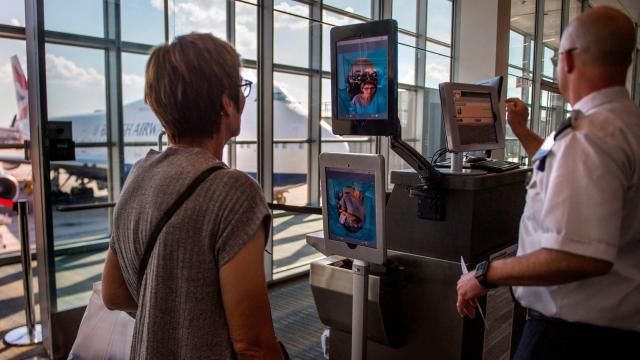Facial recognition technology has been creeping into American airports for a few years, but now the Department of Homeland Security (DHS) is trying to give its agents the ability to perform mandatory face scans on all U.S. citizens travelling into and out of the country.
[referenced url=”https://gizmodo.com.au/2019/12/new-cell-phone-users-in-china-must-now-submit-to-face-recognition-scans/” thumb=”https://i.kinja-img.com/gawker-media/image/upload/t_ku-large/wfpgp2hb5bapjd3luqdz.jpg” title=”New Phone Users In China Must Now Submit To Face Recognition Scans” excerpt=”Effective yesterday, consumers registering new phone numbers or purchasing SIM cards in China have to get their faces scanned under a new rule that orders citizens to submit their identities to facial recognition companies.”]
DHS has been testing facial recognition systems at U.S. airports since 2016. That technology used photos taken of people at TSA checkpoints for facial verification for the identity of international travellers. Earlier this year, BuzzFeed obtained documents that revealed DHS was planning to implement that system at the country’s top 20 airports by 2021. But the current rules state that U.S. citizens are exempt from such biometric checks.
Now it seems that DHS doesn’t want U.S. citizens to get a pass. As the Identity Project reports, the DHS has proposed in a recent filing that it will expand its current facial recognition policy “to provide that all travellers, including US citizens, may be required to be photographed upon entry and/or departure” from the country.
The planned expansion of this biometric system policy has been condemned by the American Civil Liberties Union. “Time and again, the government told the public and members of Congress that U.S. citizens would not be required to submit to this intrusive surveillance technology as a condition of travelling,” ACLU senior policy analyst Jay Stanley said in a statement shared with Gizmodo. “This new notice suggests that the government is reneging on what was already an insufficient promise.”
Stanley added that U.S. citizens have a constitutional right to travel and they shouldn’t have to “submit to invasive biometric scans” in order to exercise that right. “The government’s insistence on hurtling forward with a large-scale deployment of this powerful surveillance technology raises profound privacy concerns,” Stanley said. “These concerns are compounded by a lack of congressional authorisation and sufficient safeguards, the government’s past security failures, and unanswered questions about the technology’s effectiveness, bias, and broader societal implications.”
Among his concerns, Stanley referenced the U.S. Customs and Border Protections revealing this summer that photos of travellers as well as their licence plates were compromised in a cyberattack targeting a federal subcontractor.
DHS did not respond to a Gizmodo request for comment. The agency’s director of policy and planning Michael Hardin told CNN the regulation is in its “final stages of clearance” and is awaiting a public comment period.
Stanley said lawmakers should intervene to stop the agency from implementing this type of surveillance technology.
